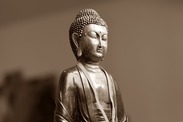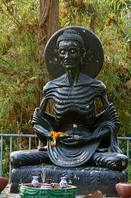
SIddhartha Gautama, now known to his followers as the Buddha, live in North East India and from an early age was intrigued by the suffering of the world. He grew up in a Hindu household, Legend would have it that he was the son of a king and his father was determined that he should never see suffering and so was locked up inside the palace. However inevitably Siddhartha did see suffering: His mother died when he was young, and he was not satisfied remaining within the palace and wish to see outside of the walls. So he instructed his chariot driver Chana to take him outside and show him the world. Here he saw for sights that changed his philosophical outlook forever.
- He saw an old man.
- He saw a sick man.
- He saw a dead man.
- And he saw a holy man.

Buddhism is the teaching of those truths - what is known to Buddhist as the Dharma. Buddhism is not in fact all that relaxed and liberal, as some people might have you believe. Rather, it is full of lists and traditions that the Buddha passed onto his followers and they try to remember and practice today. These include the learning of the four Noble Truths, the five moral precepts and the eightfold path. The aim of all these practices is detach oneself from the material things of this life, whilst not depriving oneself fully, to reach a state where at death one will pass into Nirvana.
The Buddha realised that suffering cannot be avoided completely but one can take steps to limit its influence upon oneself and so reach the ultimate goal.


 RSS Feed
RSS Feed
